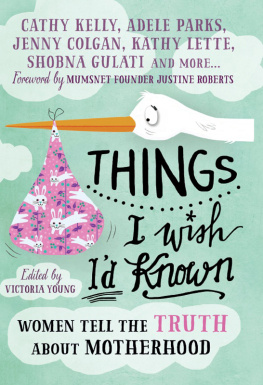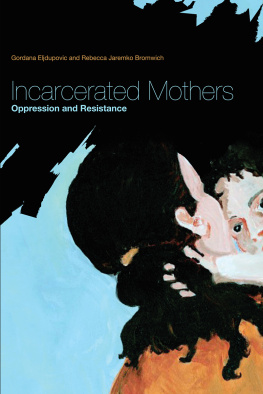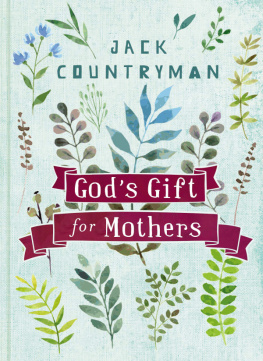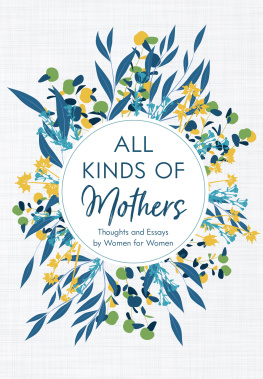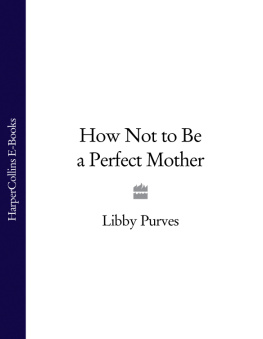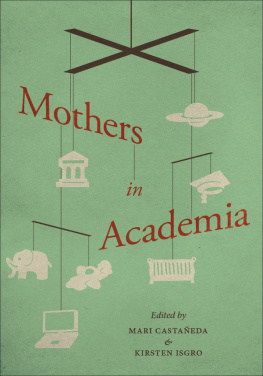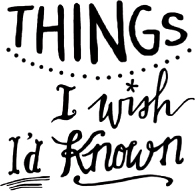

EDITED BY VICTORIA YOUNG
Foreword by Justine Roberts
Contributors:
Adele Parks, Kathy Lette, Cathy Kelly, Bryony Gordon, Jenny Colgan, Christina Hopkinson, Anne Marie Scanlon, Emma Freud, Tiffanie Darke, Anna Moore, Esther Walker, Rachel Johnson, Lucy Porter, Afsaneh Knight, Clover Stroud, Nicci Gerard, Daisy Garnett, Alix Walker, Shobna Gulati

Published in the UK in 2015 by
Icon Books Ltd, Omnibus Business Centre,
3941 North Road, London N7 9DP
email:
www.iconbooks.com
Sold in the UK, Europe and Asia
by Faber & Faber Ltd, Bloomsbury House,
7477 Great Russell Street,
London WC1B 3DA or their agents
Distributed in the UK, Europe and Asia
by TBS Ltd, TBS Distribution Centre, Colchester Road,
Frating Green, Colchester CO7 7DW
Distributed in Australia and New Zealand
by Allen & Unwin Pty Ltd,
PO Box 8500, 83 Alexander Street,
Crows Nest, NSW 2065
Distributed in South Africa by
Jonathan Ball, Office B4, The District,
41 Sir Lowry Road, Woodstock 7925
ISBN: 978-184831-836-6
Text copyright: Introduction Victoria Young 2015, Foreword Justine Roberts 2015, Lost Property Adele Parks 2015, Lessons from Motherhood Daisy Garnett 2015, What to Expect When You Are Expecting and Then That Thing You Are Expecting Doesnt Happen Emma Freud 2015, Single Plus One Anne Marie Scanlon 2015, Bite Me, Baby Experts! Afsaneh Knight 2015, The Breastfeeding Queen Who Never Was Bryony Gordon 2015, Working it Out Tiffanie Darke 2015, Motherhood: The Memo Rachel Johnson 2015, Babies Bounce Jenny Colgan 2015, Motherhood: 1,001 Nights Nicci Gerard 2015, The Life of Mammals Cathy Kelly 2015, Motherhood: The Eternal Imprint Clover Stroud 2015, Feed Me Esther Walker 2015, Stockholm Syndrome Anna Moore 2015, I Turned Parenting into a Test (and Scored an F) Christina Hopkinson 2015, Stiff Upper Labia Kathy Lette 2015, On Being an Older Mum Lucy Porter 2015, The Sleeping Babies Lie Alix Walker 2015, Mum. Mother. Mama. Shobna Gulati 2015
The Authors have asserted their moral rights.
No part of this book may be reproduced in any form, or by any means, without prior permission in writing from the publisher.
The anecdotes in this book are written from personal experience, and are not intended to be a replacement for professional, expert or medical advice. Neither the authors nor the publisher shall be liable or responsible for any loss or damage allegedly arising from any information or suggestion in this book.
Typeset in ITC Esprit by Marie Doherty
Printed and bound in the UK by Clays Ltd, St Ives plc
For Tom and Max
Introduction
By Victoria Young
T his is the book I wish had existed during my first few years of motherhood. If youve picked it up and are wondering whether its for you, or maybe for someone you know, the first thing to mention is that this is definitely not a How To book. Rather, what you will find here is a collection of very different women sharing their unique, honest experience of motherhood: the highs and the lows, the funny bits and the sad bits, the good, the bad and the not always pretty.
When I first started approaching women asking them if they wanted to write something about motherhood, the overwhelming response was yes they all had so much to say. But what really struck me as the book started coming together is that every single woman wanted to write about something different, whether it was navigating the world as a single mother of an unplanned baby, having a baby who thought sleep was for losers or how to nurture a relationship that has gone from being two to three. And thats the thing about motherhood there are as many ways to be a mother as there are women, and there is no one right way to do any of it. Its just that when you are surrounded by all those how-to books its easy to get confused and think that they are right, and you are wrong.
When I was first pregnant, four years ago, I spent hour upon endless hour thinking about my pregnancy and birth: buying a birthing pool, reading books about natural birth and assembling an ambient playlist in preparation for my home birth. But I gave barely any thought to what would happen if things didnt quite pan out as Id planned (like, say, if my home birth ended up being an emergency C-section). And although I was aware, in the most abstract way, that life as I knew it was about to change, the amount of time I spent dwelling on what life would actually be like once the baby had arrived was virtually nil. Or, rather, the time I spent thinking about it was coloured by, for example, my NCT class on breastfeeding, which consisted mainly of describing how, left to its own devices, my newborn would crawl up my tummy and self-latch.
In my case that information turned out to be so inaccurate as to be almost criminal, and, in retrospect, I wish I had asked for my money back. Unfortunately, I was too busy sitting on the sofa with each boob tethered to a milk-expressing flagon to do much of anything else for six months, because no matter how hard I tried and BOY, did I try breastfeeding didnt really happen. But I really hung on in there with the expressing because at that stage I was still certain that denying your child breast milk was tantamount to child abuse, and that formula is the devil, obviously. I know lots of women take happily to breastfeeding like ducks to water, and that is a wonderful thing. I just wish Id prepared for the possibility that not everyone does. The bottom line is that, despite reading many manuals about the theory of motherhood, somehow none of them even remotely prepared me for the reality of it.
The propaganda about motherhood starts in pregnancy, when people cross crowded rooms to stroke your bump and tell you, misty-eyed, how much they miss those early days and what a wonderful mother you will be. Its lovely, in a way, how society conspires to treat pregnant women like fragile creatures who will be transported on a cloud to the flower-scented meadow of motherhood. But its not very helpful. For some reason its deemed cruel or distasteful or unfair to talk honestly to pregnant women about what lies ahead. Instead, people and weirdly, its mostly other women perpetuate a vague, fluffy idealisation of the truth that can be projected and spun out for nine months, which pregnant women, who know no better, get lulled into believing.
The problem with that, of course, is that when the baby actually comes along, the reality can be that much harder to deal with. Worse, it can leave women feeling they must be somehow lacking as a mother if they find it difficult. I know I felt that way. Even so, somehow the realities of motherhood often remain a hidden world, not talked about out loud.
But what I have slowly discovered is that everyone has a different experience and, often, its not straightforward. For every woman who has had an ecstatic birth followed by unparalleled joy and happiness at being a mother, there is someone for whom parenthood has had a difficult start because of colic (unexplained and relentless crying), a sleepless baby or because they are doing it solo or just because of bewilderment at this new state of affairs: adjusting to having a third person in your relationship or to having a body that is battle-scarred and unrecognisable. Not to mention never having even close to enough sleep.
Personally, I probably had an unusually difficult start to motherhood my baby was hospitalised for a week when he was ten days old because he was so dehydrated, after which he was tube-fed (and had nothing by mouth) for twelve weeks while doctors decided whether there was something wrong with his swallow. As it turned out there was not, but by the time the feeding tube came out, my son had lost the urge to breastfeed. So that was tough, and not at all what Id expected those early days to be like.
Next page
